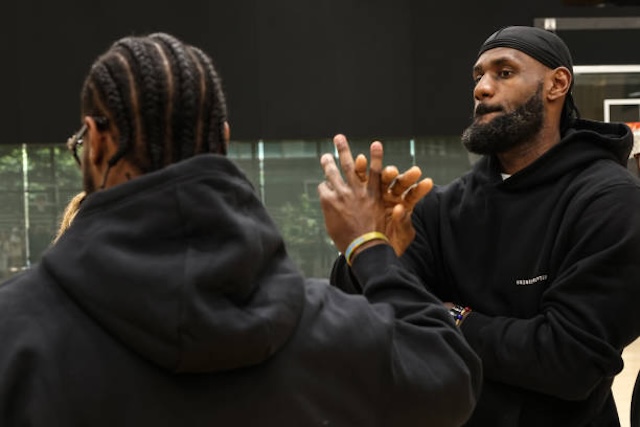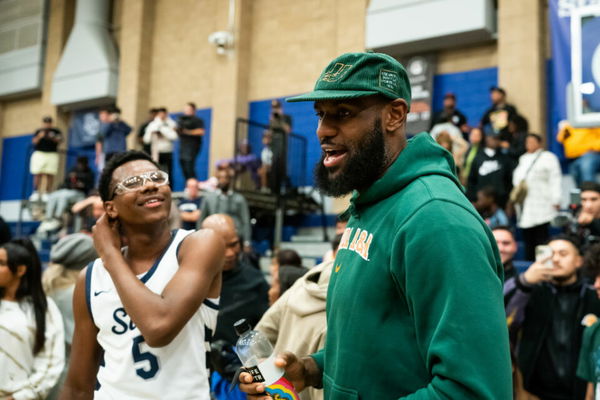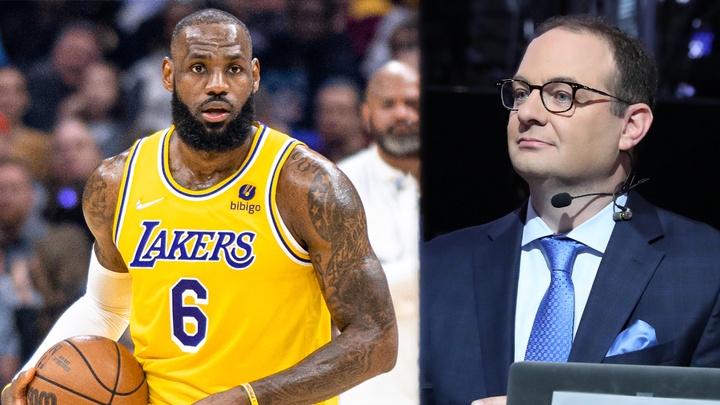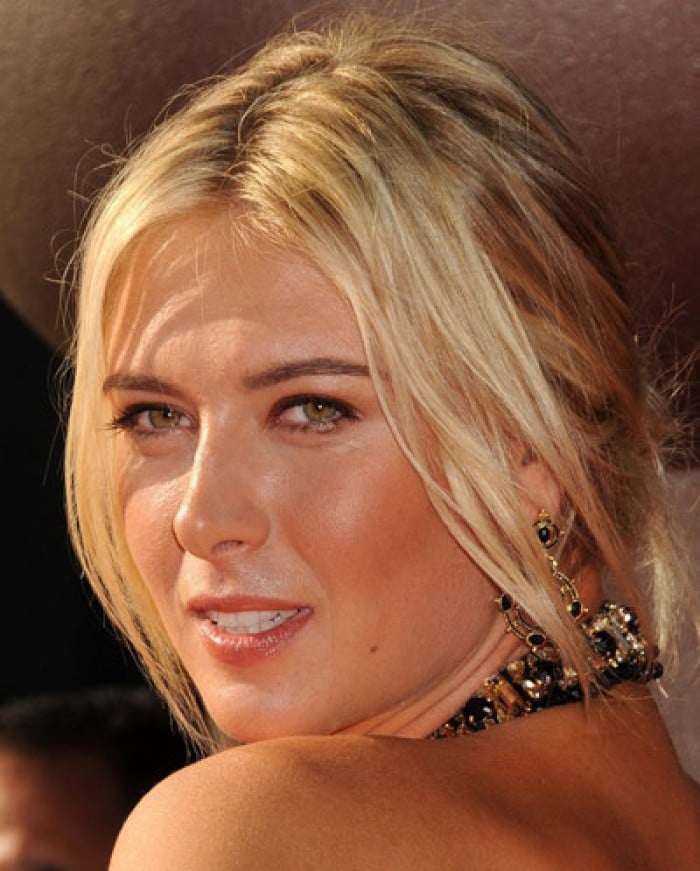Maria Sharapova’s first significant breakthrough in professional tennis was her victory over Serena Williams in the 2004 Wimbledon final. In the years since then, the rivalry has been one-sided; Williams has won their last 18 matches.
In her new memoir, Unstoppable: My Life So Far, Sharapova speaks of Williams in a detailed and often antagonistic way rarely used to discuss an active rival. Plenty of tennis players write autobiographies. Few, if any, write so candidly about a rival before they have played their last match.
Though the majority of the book is about her own journey through tennis, starting with her immigration to Florida from Russia at the age of six, Sharapova details how she has positioned herself against Williams since a young age, and how her childhood impressions of Williams continue to inform her perception of her.
When Sharapova was 12, Serena and Venus Williams went for an open practice session to the academy in Florida where Sharapova trained. While many gathered to watch, Sharapova did not want to give the sisters the satisfaction of seeing her in the stands – even though they would have had no idea who she was at that point.
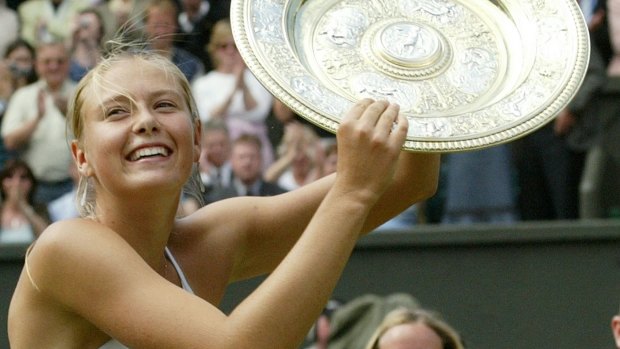
“I’d never put myself in the position of worshipping them, looking up, being a fan,” Sharapova writes.
Instead, Sharapova’s father found a clandestine spot for her to watch: inside a shed, hidden from view.
“I could watch through a kind of knothole – just me alone, in the dark, seeing the next 20 years of my life,” she writes. “The image of the Williams sisters would eventually become iconic, and it was in the works even then. They are a force. Tall girls in tennis whites, with bright smiles and piercing, focused eyes.”
Sharapova next encountered Williams three years later at the 2002 Wimbledon champions’ ball, when she felt compelled to sit as others stood as the champion made her entrance.
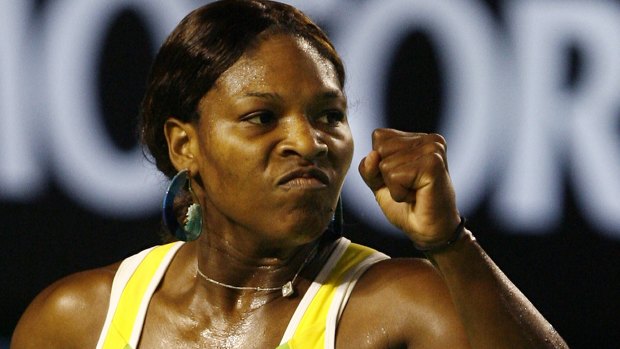
“I wanted to get up, but my body just would not let me,” she writes. “It was as if I were stuck in that chair, staring at Serena through the crowd of people, with a single thought in my head: ‘I am going to get you’.”
Sharapova first played Williams in Miami in 2004. “It was like yes, finally,” she writes. “It felt as if I’d been circling around her for years.”
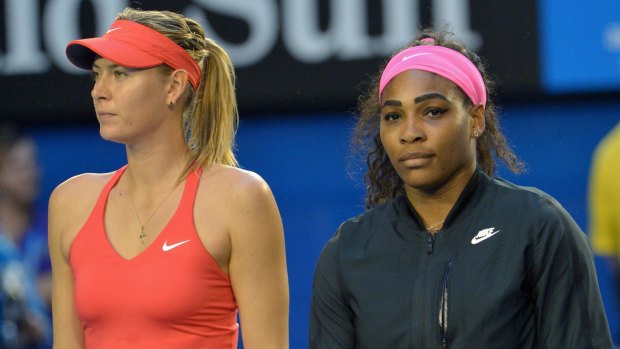
Sharapova describes seeing Williams at that moment with much of her same childlike awe. “First of all, her physical presence is much stronger and bigger than you realise watching TV,” Sharapova writes. “She has thick arms and thick legs and is so intimidating and strong. And tall, really tall.” (Sharapova, at 188 centimetres, is 13 centimetres taller than Williams.)
“I looked across the net, and, no way to get around it, she was just there!” Sharapova continues. “More there than other players, if that makes sense. It’s the whole thing – her presence, her confidence, her personality. She seemed much older than me in Miami. This was just before I turned 17. She was a grown woman, experienced, the best player in the world. It still feels that way. Even now, she can still make me feel like a little girl.”
Sharapova also used similar language to describe Lindsay Davenport, whom she beat in the 2004 Wimbledon semi-final: “I was overpowered, overmatched. She was a woman. I was a girl. She was big. I was small.”
But Davenport, against whom Sharapova had a 5-1 record, is not a preoccupying force in her life. Nor is Williams’ sister, Venus, against whom Sharapova is 5-3.
It is Serena who continues to make Sharapova feel diminished, as she continues to discuss her aura before their 2004 Wimbledon final: “You are a speed bump. You are a zero. Many great players have this mentality. Serena Williams just has it more.”
Sharapova beat Williams in that match, but believes its aftermath has cost her every match since. Williams, she believes, was determined to crush Sharapova after Sharapova heard her crying in the locker room.
“Guttural sobs, the sort that make you heave for air, the sort that scares you,” Sharapova writes. “It went on and on. I got out as quickly as I could, but she knew I was there. People often wonder why I have had so much trouble beating Serena; she’s owned me in the past 10 years. My record against her is two and 19.
“In analysing this, people talk about Serena’s strength, her serve and confidence, how her particular game matches up to my particular game, and, sure there is truth to all of that; but, to me, the real answer was there, in this locker room, where I was changing and she was bawling. I think Serena hated me for being the skinny kid who beat her, against all odds, at Wimbledon.”
Williams’ agent, Jill Smoller, did not respond to a call seeking comment on Monday.
In contrast to Sharapova, Williams left rivals largely undiscussed in her own mid-career memoir, On The Line, published in 2009. There was barely any mention in that book of Justine Henin, who had been Williams’ own chief tormentor through several stretches of her career, including knocking her out of three consecutive grand slam quarter-finals events in 2007.
Sharapova leaves out many turns in their relationship on and off the court, including the 6-1, 6-2 drubbing in the 2007 Australian Open final, which seemed to turn the rivalry in Williams’ favour for good, as well as the 2013 war of words between the two at Wimbledon punctuated by public shots at each other’s personal lives.
Sharapova, though, does not hide her fascination with the woman who has defined so much of her career.
“Serena and I should be friends: we love the same thing, we have the same passion,” she writes. “Only a few people in the world know what we know – what it feels like in the dead centre of this storm, the fear and anger that drive you, how it is to win and how it is to lose. But we are not friends – not at all.
“I think, to some extent, we have driven each other. Maybe that’s better than being friends. Maybe that’s what it takes to fire up the proper fury. Only when you have that intense antagonism can you find the strength to finish her off. But who knows? Someday, when all this is in our past, maybe we’ll become friends. Or not. You never can tell.”
